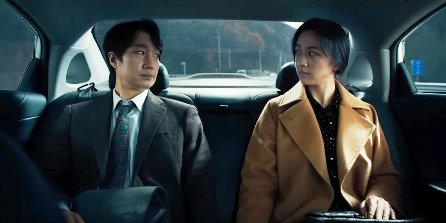 A homicide detective becomes romantically obsessed with a woman suspected of killing her husband, in this stylish mystery from Park Chan-wook.
A homicide detective becomes romantically obsessed with a woman suspected of killing her husband, in this stylish mystery from Park Chan-wook.
The cinematic world is abuzz with praise for the latest film from Korean director Park Chan-wook entitled Decision to Leave. Park is already well known for his daring movies treating themes of horror and violence, most famously The Handmaiden, and Oldboy. As it happens, Decision to Leave is something of a departure for him, a stylish murder mystery and intense romantic suspense film. Although the new picture has relatively less violence or horror, Park’s love of provocative experimentation remains.
The story concerns a homicide detective from Busan named Jang Hae-joon, and played by the very skillful Park Hae-il. He’s a dogged investigator in his 40s, with a lovely wife that lives in another town and whom he only sees on weekends. Currently assigned to a sensational murder case, he is called one night to what looks like a bad accident—a climber has fallen off a steep cliff to his death. But the dead man, an immigration officer, has DNA traces under his fingernails, which match the DNA of his wife, Song Seo-rae. Suspicion falls on her because she shows no surprise or sorrow when told of her husband’s death. Medical records, however, show that she had been physically abused many times by her husband, who beat her and scratched her, which would explain the DNA under the fingernails. So the evidence begins to point to suicide rather than foul play. But this mysterious woman, Seo-rae, begins to evoke an attraction in the cop investigating her. She’s Chinese, and her difficulty speaking Korean somehow adds to her strange charm. Seemingly against his will, Jang becomes gradually more obsessed with her, to the point that it becomes noticeable to his colleagues, who complain that he’s neglecting the high-profile murder case of which he’s in charge.
Park’s sense of screen composition is so smooth and assured that Decision to Leave can’t help but remind me of great Hollywood films from the classic era, and specifically of Alfred Hitchcock. The idea of a man’s overpowering obsession with an unknowable love object is of course paralleled in Hitchcock’s great 1958 film Vertigo. But this movie has a different emphasis and a more modernist technique. When the film reveals something from the past, instead of clearly demarcating the different time frames in some way, Park cuts suddenly to a similar shot and point of view, when we suddenly realize we’re in the past, without a transition. This creates a fluid subjective quality—we’re inside Jang’s head, where his experience and memory become interchangeable. And the film does the same thing with space as with time. At one point, Jang is doing surveillance of Seo-rae with binoculars, in his car outside her building. But then, as she picks up the telephone, he is suddenly in the room gazing at her, sniffing the air, and then she looks straight out the window, startling him, and all this time he is still in the car. The multilayered visual style depicts almost tangibly the progression of Jang’s mad love for this woman, who remains a suspect.
I don’t think this would work so well if Park hadn’t chosen the perfect person to play Seo-rae, the subtly beautiful Chinese actress Tang Wei. Tang doesn’t play a seductress here. On the contrary, her seriousness and the ambiguity of her facial expressions convey the idea that this is someone who is wholly her own person, and someone you want to believe.
The murder mystery is complicated, and the viewer must pay close attention to follow it. But the real story here is the emotional journey of a man desperately and dangerously in love. Decision to Leave is a glittering jewel of a film.

Chris Dashiell celebrates his favorite films from last year. At the end of a year, film critics start putting out “Top 10” lists or...

French director Jean Vigo, who died when he was only 29, became an inspiration for several generations of innovative filmmakers. Never has a filmmaker...

A detective investigating a series of murders in rural China is confronted with his own instability. “Self-aware cinema” is a nickname, that I just...